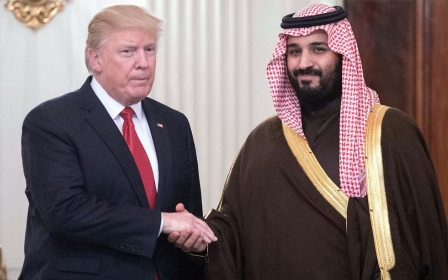Jamal Khashoggi called for freedom of expression in final column

It's fitting, albeit overwhelmingly bittersweet, that in what is likely Jamal Khashoggi's final column, the missing Saudi journalist made an impassioned plea for freedom of expression in the Arab world.
The piece, published by the Washington Post late on Wednesday in both English and Arabic, begins with the fact that only one country in the region - Tunisia - was classified as "free" in 2018, according to Freedom House's annual ranking.
As a result of a lack of freedom to information, media and public debate, "Arabs living in these countries are either uninformed or misinformed," Khashoggi wrote.
"They are unable to adequately address, much less publicly discuss, matters that affect the region and their day-to-day lives. A state-run narrative dominates the public psyche, and while many do not believe it, a large majority of the population falls victim to this false narrative. Sadly, this situation is unlikely to change."
Arab governments have been given free rein to continue silencing the media at an increasing rate
- Jamal Khashoggi
Khashoggi, a Saudi insider-turned-critic, was last seen on 2 October entering the Saudi consulate in Istanbul. Turkish officials say they believe he was killed inside the building.
Saudi officials have vehemently denied any involvement in Khashoggi's disappearance and say that he left the consulate soon after arriving. However, they have not presented any evidence to corroborate their claim and say that video cameras at the consulate were not recording at the time.
In the piece, Khashoggi condemned the jailing of Saudi writer Saleh al-Shehi - whom he described as a "dear friend" - over comments he made that ran afoul of "the Saudi establishment".
He also criticised the Egyptian government's shut down of the print edition of the al-Masry al-Youm newspaper.
"These actions no longer carry the consequence of a backlash from the international community. Instead, these actions may trigger condemnation quickly followed by silence. As a result, Arab governments have been given free rein to continue silencing the media at an increasing rate," he wrote.
The solution, according to Khashoggi, is "a modern version of the old transnational media so citizens can be informed about global events".
"More important, we need to provide a platform for Arab voices," he wrote.
'This is the last piece'
In a note at the top of the piece, Khashoggi's editor at the Post, Karen Attiah, explained that she received the column from Kashoggi's assistant and translator a day after he was reported missing, now more than two weeks ago.
"The Post held off publishing it because we hoped Jamal would come back to us so that he and I could edit it together. Now I have to accept: That is not going to happen," Attiah wrote.
"This is the last piece of his I will edit for The Post. This column perfectly captures his commitment and passion for freedom in the Arab world. A freedom he apparently gave his life for.
"I will be forever grateful he chose The Post as his final journalistic home one year ago and gave us the chance to work together."
Stay informed with MEE's newsletters
Sign up to get the latest alerts, insights and analysis, starting with Turkey Unpacked
Middle East Eye delivers independent and unrivalled coverage and analysis of the Middle East, North Africa and beyond. To learn more about republishing this content and the associated fees, please fill out this form. More about MEE can be found here.




